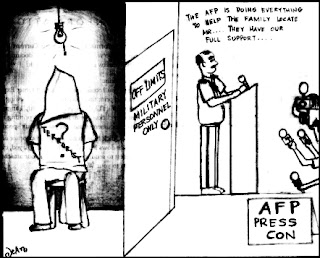Like many writers from Europe, however, I subscribe to the old world philosophy that copyright is a human right -- that it transcends business interests and embraces the sacred relationship between the creator and the creation -- the author and the work.
Although domestic laws and treaties do contain provisions on protecting intellectual property, they cannot be considered the ultimate source of these rights. They do not arise from agreements or legislation, but from human nature as creator.
Two important pieces of international law articulate this philosophy:
1. Article 27 (2) of The Universal Declaration of Human Rights (UDHR), known to be the document of authority for human rights, reads:
Everyone has the right to protection of the moral and material interests resulting from any scientific, literary or artistic production of which he is the author;2. Article 15 (1) of The United Nations Covenant on Economic, Social and Cultural Rights (UNCESCR) also reads:
The State Parties to the present Covenant recognize the right of everyone to benefit from the protection of the moral and material interests resulting from any scientific, literary or artistic production of which he is the author.
Like any other person of any other profession, artists, authors and scientists deserve to make a living from their talents. More importantly, they must be acknowledged as the creators of their work.
So is copyright a human right? To give a yes or no answer to the issue would be a serious oversimplification that ignores the history and philosophy behind copyright.
The right answer would have to be "partially" -- copyright is partially a human right. At least in the Philippine legal system, it has to be understood this way. Why? Because our law fuses (or confuses) the concept of copyright in the civil law and the common law sense.
Civil law traditions treat copyright or author's rights (droit d'auteur to the French; Urheberrecht to the Germans) as a sacred bond between the author and the work. These rights form what we call in the Philippine IP Code as moral rights. Moral rights, particularly the right of paternity, ought to last forever (e.g. William Shakespeare's authorship to Hamlet will never expire by mere passage of time).
This is the part of copyright which I am inclined to declare as a human right -- the right of paternity. Like any other human right, it is imprescriptible, inherent, inalienable and universal. Authorship, therefore, must be likened to a status rather than a right. For a right often disappears after the death of the owner while a status of paternity lasts forever.
So what is the right of Paternity? Section 193.1 of the Philippine IP Code describes it as
the right to require that the authorship of the works be attributed to him, in particular, the right that his name, as far as practicable, be indicated in a prominent way on the copies, and in connection with the public use of his work
The old intellectual property law (PD 49) correctly declared that the right of paternity lasts forever. The new law downgraded the right to last only for as long as the economic rights (generally the author's lifetime plus 50 years). This is unacceptable because it limits that part of copyright that is a human right. Today, a bill is being discussed in the Philippine House of Representatives to revert back to the old rule. I hope that the fruit of these discussions finds its way into law very soon.
Common law traditions, on the other hand, tend to focus on the economic benefits of copyright and how it can be used to generate wealth. In Philippine law, these are called economic rights. Economic rights necessarily last only for a certain period of time because they are only statutory grants used to secure a return on investment plus profits for the creator of a work and his or her heirs.
This is the part of copyright that I consider merely a temporary grant by law, which may be removed or suspended for a greater public purpose. They are not imprescriptible, inherent, inalienable or universal. They, therefore, do not possess the essential characteristics of human rights.
So here we have the Philippine copyright system. By way of Spain, we carry the long-standing traditions of civil law going back to the Roman Empire -- a philosophy which treats authorship with unique but well-deserved reverence. By way of America, we carry enterprising prowess of the common law tradition -- a philosophy grounded more on giving each creator a livelihood and a chance at survival. And somewhere in the middle of all this, we find ourselves still trying to figure out what to do with our inexhaustible creativity and how it can lift us up to better places.
For now, we can rest better knowing that we do possess human rights as creators... Partially.
_____
For further reading:





